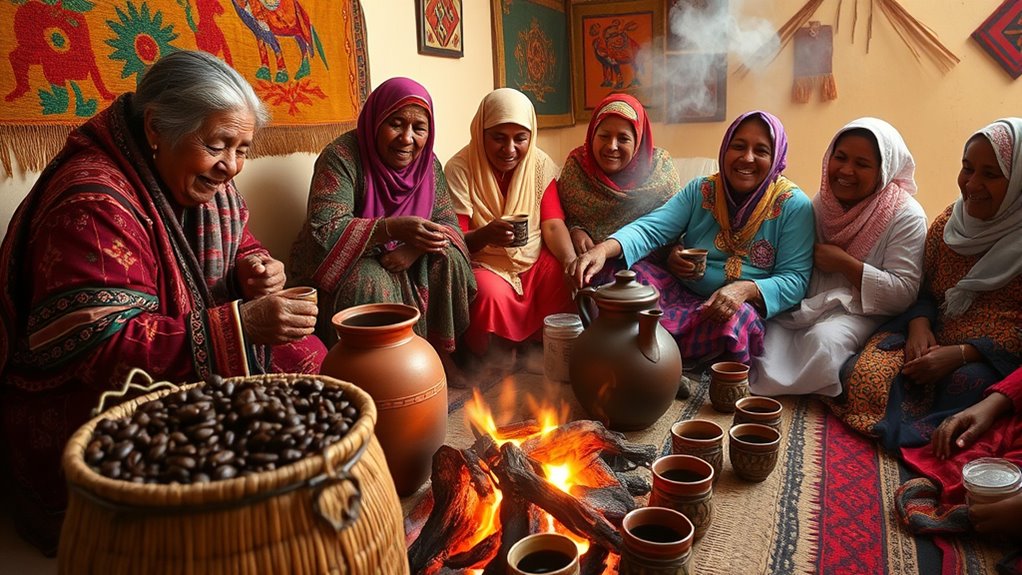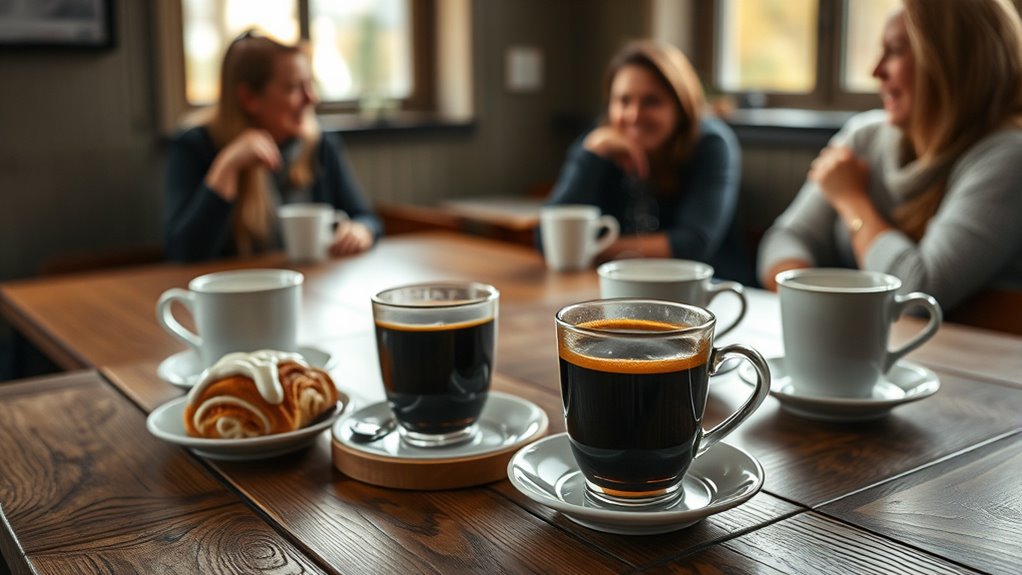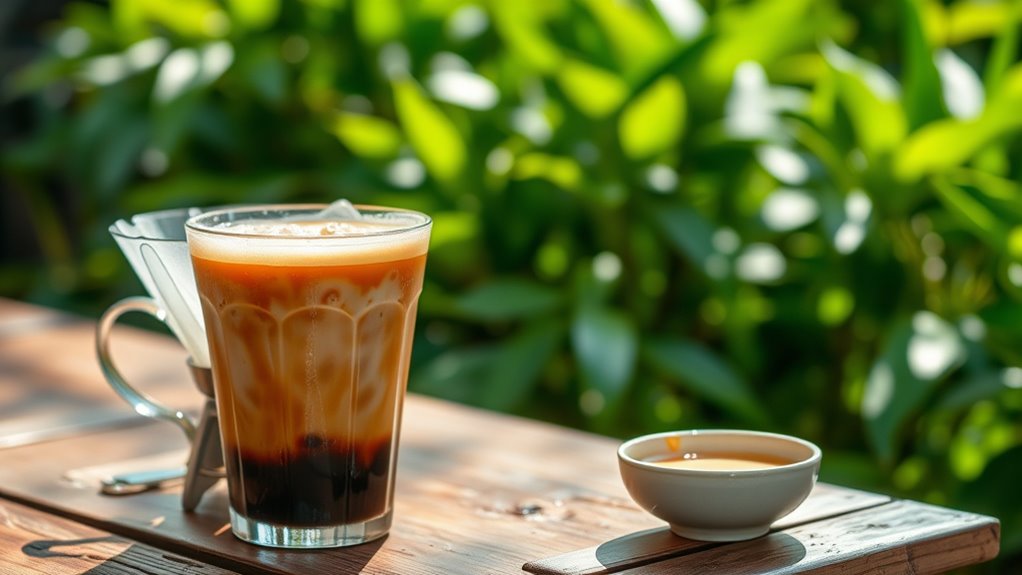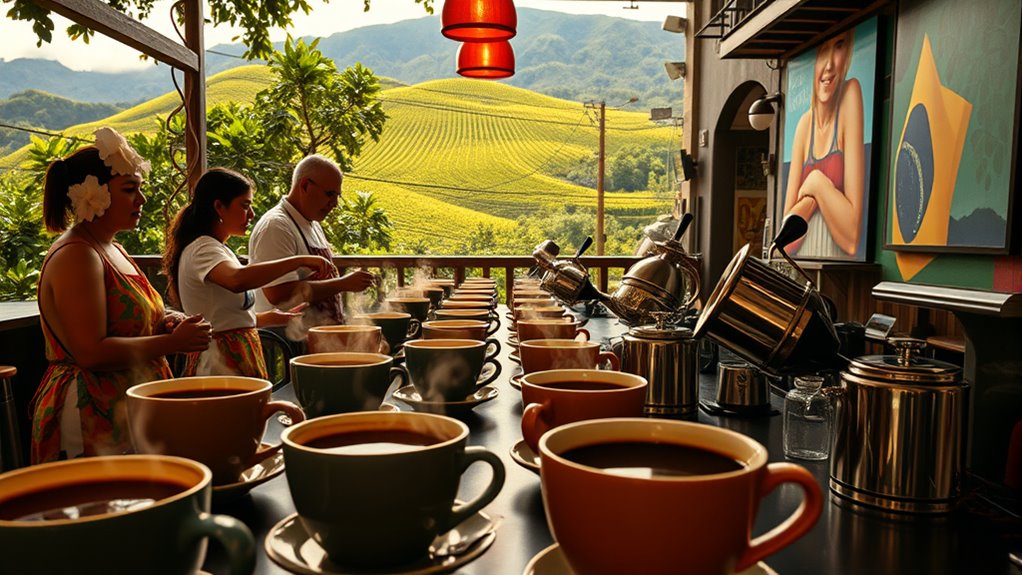Explore how seven countries celebrate coffee in unique ways. In Italy, you’ll enjoy rich espresso crafted with precision. Ethiopia’s coffee ceremony creates warm social moments, while Turkish coffee offers bold, slow-brewed flavors. Swedes cherish relaxing Fika moments, and Vietnam’s iced coffee combines sweetness and strength. Brazil’s vibrant culture revolves around communal coffee traditions, and Japan’s focus on specialty pour-overs elevates every cup. If you keep exploring, you’ll discover the fascinating stories behind each country’s coffee passions.
Key Takeaways
- Different countries emphasize unique brewing techniques, such as Italy’s espresso, Ethiopia’s coffee ceremony, and Vietnam’s drip filters.
- Coffee rituals reflect cultural values, like Ethiopia’s communal ceremonies and Sweden’s Fika for social connection.
- National identities are expressed through coffee traditions, showcasing craftsmanship in Italy and cultural heritage in Ethiopia.
- Consumption styles vary from quick espresso in Italy to iced coffee in Vietnam, highlighting climate and lifestyle influences.
- Coffee’s societal role spans social bonding, economic importance, and cultural pride across countries like Brazil, Japan, and Turkey.
Italy: The Art of Espresso and Café Culture

Italy’s café culture is a vibrant expression of its social life, with espresso sitting at its heart. When you visit a local café, you’ll notice baristas mastering espresso techniques to craft the perfect shot. They focus on grind size, tamping pressure, and brewing time to guarantee a rich, balanced flavor. As you watch, you might see coffee art forming intricate patterns atop your espresso—an artful touch that elevates the experience. Italians take pride in their espresso, often enjoying it quickly at the counter or standing at a small table, embracing the brief, social moment. This attention to detail and passion for quality define Italy’s coffee scene, making each cup a small but significant celebration of tradition and craftsmanship. Additionally, the skill involved in creating coffee art highlights the artistry that elevates everyday coffee into a cultural experience. The meticulous preparation and presentation reflect Italy’s broader appreciation for culinary craftsmanship and attention to detail in their traditions. Furthermore, Italy’s dedication to coffee quality ensures that each cup maintains high standards, reinforcing their national pride in coffee making. The cultural emphasis on coffee ritual also fosters a sense of community among enthusiasts and casual drinkers alike. With ongoing innovations in espresso techniques, Italian cafes continue to refine their craft while preserving centuries-old traditions.
Ethiopia: Coffee Ceremonies and Traditional Rituals

In Ethiopia, coffee is more than just a beverage; it’s a vital part of social life and cultural identity. The coffee ceremony holds deep ritual significance, symbolizing hospitality, respect, and community bonding. When you participate, you’ll notice the emphasis on coffee symbolism—each step reflects tradition and reverence. You might observe the roasting of green beans, the brewing over a fire, and the pouring of coffee into small cups. This ritual creates an intimate atmosphere and preserves heritage. The ceremony often involves storytelling, music, and shared moments, highlighting its importance beyond drinking. Engaging in this tradition lets you experience Ethiopia’s rich cultural fabric firsthand. The coffee ritual itself embodies a series of symbolic gestures that reinforce social bonds and cultural values, showcasing the deep-rooted significance of coffee in Ethiopian society. Additionally, the cultural importance of coffee ceremonies plays a crucial role in maintaining social cohesion and honoring ancestral customs. The ritual process also serves to pass down traditions and values from generation to generation, strengthening community ties. Recognizing the social function of these ceremonies helps outsiders appreciate the depth of Ethiopia’s cultural heritage beyond just the act of drinking coffee.
Turkey: The Rich Flavor of Turkish Coffee

After experiencing Ethiopia’s vibrant coffee ceremonies, you can appreciate how deeply coffee is woven into cultural traditions. In Turkey, the rich flavor of Turkish coffee captures this cultural importance through its unique brewing techniques. You begin by finely grinding dark roast coffee, then simmering it slowly in a cezve, a small pot designed for this purpose. As the coffee brews, the enticing coffee aroma fills the air, building anticipation. You don’t stir or filter; instead, you pour the thick, unfiltered brew directly into small cups, often topped with foam. This method emphasizes the coffee’s bold taste and smooth texture. The traditional serving rituals further enhance the experience, making Turkish coffee a cultural icon that embodies hospitality and social bonding. The process also highlights the importance of traditional brewing methods in preserving cultural identity. Turkish coffee isn’t just a drink—it’s a ritual, a moment of connection, and a cherished tradition that celebrates the art of brewing.

Swedish culture values more than just coffee; it turns each break into a cherished social ritual called fika. During fika, you’re encouraged to slow down, connect, and enjoy good company with a cup of coffee. To embrace this tradition, pay attention to coffee etiquette—whether it’s offering a refill or sharing homemade treats. Brewing techniques matter too; many Swedes prefer filter coffee or pour-over methods that highlight rich flavors. Fika isn’t just about caffeine—it’s about creating a cozy, communal atmosphere. Additionally, understanding the importance of cookie categories helps in selecting appropriate snacks to accompany your coffee.
- Savor your coffee with a sweet pastry or cookie
- Use a clean cup and proper serving ware
- Engage in relaxed conversations during breaks
- Respect others’ coffee preferences
- Take your time to enjoy the moment
Vietnam: Iced Coffee and the Sweetened Brew

Vietnamese iced coffee is a staple you’ll see everywhere, especially hot days when a cold drink hits the spot. The sweetened brew, often made with condensed milk, adds a rich, creamy flavor that locals love. This combination of iced coffee and sweetened beverages highlights Vietnam’s unique coffee customs and vibrant drinking culture. Additionally, the use of specialized brewing methods like the traditional drip filter ensures a strong, flavorful base for these refreshing drinks. Many cafes also incorporate comfort and support solutions to enhance the overall experience, such as comfortable seating and ambient settings that invite relaxation. Incorporating aesthetic drinkware can further elevate the visual appeal and enjoyment of these beverages. To complement the casual yet inviting atmosphere, some establishments incorporate rustic decor elements, reflecting the country’s rich cultural heritage and adding warmth to the space. Moreover, embracing market trends helps cafes adapt to evolving customer preferences and stay competitive.
Iced Coffee Popularity
Have you ever wondered why iced coffee has become a beloved staple in Vietnam? Its popularity stems from the country’s hot climate and vibrant street café culture. You’ll notice locals often enjoy a glass of cold brew, which provides a revitalizing escape from the heat. The aesthetic appeal of coffee art on iced drinks adds a creative touch that elevates the experience. Vietnam’s iced coffee tradition isn’t just about refreshment; it’s a social ritual that brings people together. Properly prepared iced coffee also reflects coffee preparation techniques to achieve the ideal texture and flavor. The use of hydrocolloid material in some modern coffee cups can help keep drinks fresh longer, enhancing the overall experience. Additionally, the cultural significance of coffee in Vietnam underscores its importance beyond mere refreshment—it’s a symbol of hospitality and community. Coffee’s role in social bonding is also supported by the country’s community support for local cafés and coffee artisans. Here’s what makes it special:
- Cold brew blends perfectly with the tropical weather
- Sweetened condensed milk balances bitterness
- Coffee art adds visual charm
- Quick preparation suits busy streets
- Iced coffee remains affordable and accessible
This combination of flavor, style, and culture cements iced coffee’s popularity across Vietnam.
Sweetened Brew Customs
In Vietnam, adding sweetened condensed milk to iced coffee is a cherished tradition that creates a rich, creamy flavor profile. You often control sugar additions, adjusting the sweetness to your liking, sometimes mixing in flavored syrups for extra complexity. The sweetened brew is poured over strong, black coffee, then blended with the milk and syrup, resulting in a smooth, indulgent drink. This custom highlights the local preference for sweetness, balancing the bold coffee taste. Whether you prefer just a touch of sugar or a more decadent experience with flavored syrups, the Vietnamese approach emphasizes personalization. The combination of sugar, condensed milk, and flavored syrups reflects an appreciation for sweet, satisfying coffee drinks that energize and comfort. Personalization is a key aspect of Vietnamese coffee culture, allowing drinkers to tailor their beverages to suit individual preferences.
Brazil: The Heartbeat of Coffee Production and Consumption

Brazil’s coffee culture runs deep, shaping daily life and national identity. You’ll see how production and export trends drive the economy and influence global markets. Plus, local coffee traditions reveal a vibrant heritage that energizes communities nationwide.
Coffee’s Cultural Significance
As the world’s leading coffee producer, Brazil’s deep-rooted coffee culture influences more than just its economy; it shapes daily life and social bonds. Coffee rituals are central to Brazilian hospitality, often shared with friends and family as a symbol of warmth and friendship. The beverage also carries cultural symbolism, representing community, tradition, and national pride. You’ll notice that coffee is more than a drink; it’s woven into social gatherings, celebrations, and even business meetings. Brazilians cherish their coffee moments, which serve as a way to connect and reinforce relationships. This cultural significance elevates coffee from a daily necessity to an essential part of Brazil’s identity, fostering a sense of unity among its people.
- Coffee rituals as social bonds
- Symbol of hospitality and warmth
- Traditions passed through generations
- Coffee’s role in celebrations
- National pride expressed through coffee
Production and Export Trends
Brazil remains the world’s leading coffee producer, dominating global markets through its vast plantations and efficient supply chain. Its export market dynamics are shaped by fluctuating demand and evolving consumer preferences. The country emphasizes sustainable farming practices to protect ecosystems and guarantee long-term production. As export volumes grow, Brazil adapts to international standards, balancing quality and quantity. This table highlights key aspects:
| Aspect | Impact |
|---|---|
| Sustainable farming | Ensures eco-friendly practices and resource conservation |
| Export market trends | Responds to global demand shifts and trade policies |
| Production levels | Remain high with technological advancements |
You play a vital role in understanding how Brazil’s strategies influence global coffee availability, balancing tradition and innovation to meet worldwide needs.
Local Coffee Traditions
Coffee is deeply woven into Brazil’s daily life, reflecting rich traditions that go beyond its role as a global producer. Locals often start their day with a quick, strong cafézinho, emphasizing hospitality and community. Brazilian coffee culture values café etiquette, where sharing coffee fosters connection. You might notice coffee art in cafes, showcasing skilled baristas creating intricate designs on your cup. In social settings, it’s common to sip coffee slowly, enjoying conversation. Brazilians also have special ways of preparing traditional brews like café com leite or café pingado. These customs highlight the importance of coffee as more than a drink—it’s a symbol of warmth and friendliness. Embracing these traditions will deepen your appreciation for Brazil’s vibrant coffee scene.
- Coffee art displays skill and creativity
- Café etiquette emphasizes respect and sharing
- Traditional brews reflect local flavors
- Coffee connects communities socially
- Morning routines are quick but meaningful
Japan: Specialty Coffee and the Perfect Pour-Over

In Japan, the coffee scene has evolved into a refined art, with specialty cafes focusing on perfecting the pour-over technique. You’ll notice that coffee aesthetics matter deeply here, with baristas carefully presenting each cup as a visual masterpiece. Brewing techniques are precise, emphasizing balance and clarity to highlight the coffee’s unique flavors. You’ll see meticulous control over water temperature, pouring speed, and coffee grind size, all aimed at achieving an ideal extraction. The emphasis is on patience and craftsmanship, transforming a simple brew into an experience. As you observe or participate, you’ll appreciate how Japanese baristas treat coffee as both a sensory delight and an art form, elevating pour-over coffee from everyday beverage to a cultural ritual.
Frequently Asked Questions
How Do Coffee Preparation Methods Influence Local Cultural Identities?
You see, coffee preparation methods shape local cultural identities by emphasizing unique brewing techniques and coffee etiquette. When you learn how a country brews its coffee, you understand its traditions and social norms. For example, in Turkey, the ritual of preparing and serving coffee reflects hospitality, while in Italy, espresso culture highlights efficiency and elegance. These methods and etiquettes become a essential part of community bonding and national pride.
What Are the Health Benefits Associated With Traditional Coffee Rituals?
Did you know that traditional coffee rituals can boost your health? Engaging in ritual mindfulness while enjoying coffee increases your awareness and reduces stress. Coffee antioxidants help fight free radicals, promoting better health and potentially lowering disease risk. These rituals not only enhance mental clarity but also foster social bonds, making your coffee experience more meaningful. So, savoring coffee with intention can offer both physical and emotional health benefits.
How Does Climate Change Impact Coffee Cultivation Worldwide?
Climate change profoundly affects coffee cultivation worldwide by altering weather patterns and increasing temperatures. You’ll need to focus on climate adaptation strategies to protect crop resilience, such as shifting planting altitudes or developing drought-resistant coffee varieties. These efforts help guarantee future coffee production, but you must stay vigilant and support sustainable practices to combat the ongoing impacts of climate change on this essential crop.
What Role Does Coffee Play in Fostering Social Connections Across Cultures?
You find that coffee plays a crucial role in fostering social connections across cultures through coffee socialization and communal gatherings. When you share a cup with others, it creates a space for conversation, bonding, and cultural exchange. Whether in a cozy café or a bustling market, coffee brings people together, helping you build relationships and celebrate traditions. This universal beverage acts as a bridge, uniting diverse communities worldwide.
How Have Modern Trends Transformed Traditional Coffee Practices Globally?
You might be surprised to learn that over 50% of global coffee consumption now involves instant coffee, showing how trends shift traditional practices. Modern trends like artificial flavoring and convenience have transformed coffee, making it more accessible and diverse. You can now enjoy flavored options or quick brews, but this also means losing some traditional methods. Embrace these changes while appreciating the rich history behind your favorite cup of coffee.
Conclusion
No matter where you go, coffee brings people together and reflects local traditions. From Italy’s espresso to Ethiopia’s ceremonies, each culture adds its unique flavor. Remember, a different cup of coffee can open your eyes to new worlds. As the saying goes, “A journey of a thousand miles begins with a single step.” So, next time you sip, embrace the rich stories behind each brew and let it inspire your own coffee adventures.









